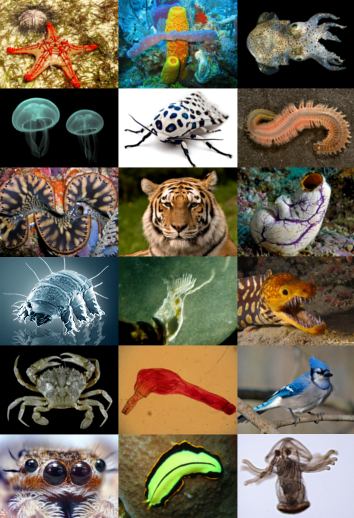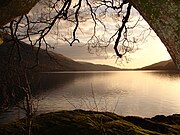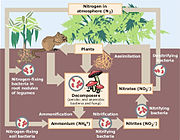Portal:Ecology
| |
|
|
Ecology
|
|
Ecology (from Ancient Greek οἶκος (oîkos) 'house', and -λογία (-logía) 'study of') is the natural science of the relationships among living organisms, including humans, and their physical environment. Ecology considers organisms at the individual, population, community, ecosystem, and biosphere level. Ecology overlaps with the closely related sciences of biogeography, evolutionary biology, genetics, ethology, and natural history. Ecology is a branch of biology, and is the study of abundance, biomass, and distribution of organisms in the context of the environment. It encompasses life processes, interactions, and adaptations; movement of materials and energy through living communities; successional development of ecosystems; cooperation, competition, and predation within and between species; and patterns of biodiversity and its effect on ecosystem processes. Ecology has practical applications in conservation biology, wetland management, natural resource management (agroecology, agriculture, forestry, agroforestry, fisheries, mining, tourism), urban planning (urban ecology), community health, economics, basic and applied science, and human social interaction (human ecology). The word ecology (German: Ökologie) was coined in 1866 by the German scientist Ernst Haeckel. The science of ecology as we know it today began with a group of American botanists in the 1890s. Evolutionary concepts relating to adaptation and natural selection are cornerstones of modern ecological theory. Ecosystems are dynamically interacting systems of organisms, the communities they make up, and the non-living (abiotic) components of their environment. Ecosystem processes, such as primary production, nutrient cycling, and niche construction, regulate the flux of energy and matter through an environment. Ecosystems have biophysical feedback mechanisms that moderate processes acting on living (biotic) and abiotic components of the planet. Ecosystems sustain life-supporting functions and provide ecosystem services like biomass production (food, fuel, fiber, and medicine), the regulation of climate, global biogeochemical cycles, water filtration, soil formation, erosion control, flood protection, and many other natural features of scientific, historical, economic, or intrinsic value. (Full article...)  The natural environment or natural world encompasses all living and non-living things occurring naturally, meaning in this case not artificial. The term is most often applied to Earth or some parts of Earth. This environment encompasses the interaction of all living species, climate, weather and natural resources that affect human survival and economic activity. The concept of the natural environment can be distinguished as components:
 Credit: Composite image created by User:Medeis The following are images from various ecology-related articles on Wikipedia.
Entries here consist of Good and Featured articles, which meet a core set of high editorial standards.
 Ambush predators or sit-and-wait predators are carnivorous animals that capture their prey via stealth, luring or by (typically instinctive) strategies utilizing an element of surprise. Unlike pursuit predators, who chase to capture prey using sheer speed or endurance, ambush predators avoid fatigue by staying in concealment, waiting patiently for the prey to get near, before launching a sudden overwhelming attack that quickly incapacitates and captures the prey. The ambush is often opportunistic, and may be set by hiding in a burrow, by camouflage, by aggressive mimicry, or by the use of a trap (e.g. a web). The predator then uses a combination of senses to detect and assess the prey, and to time the strike. Nocturnal ambush predators such as cats and snakes have vertical slit pupils helping them to judge the distance to prey in dim light. Different ambush predators use a variety of means to capture their prey, from the long sticky tongues of chameleons to the expanding mouths of frogfishes. (Full article...)Helena Norberg-Hodge is founder and director of Local Futures, previously known as the International Society for Ecology and Culture (ISEC). Local Futures is a non-profit organization "dedicated to the revitalization of cultural and biological diversity, and the strengthening of local communities and economies worldwide." Norberg-Hodge is the author of the international best-selling book Ancient Futures (1991), about tradition and change in the Himalayan region of Ladakh, available in multiple languages, as an ecobook and audiobook versions. She is also the author of Local is Our Future (2019), in which she advocates for localized alternatives to the global economy, particularly involving the creation of robust local food systems and democratic structures that can effectively resist authoritarianism. An outspoken critic of economic globalization, she co-founded – along with Jerry Mander, Doug Tompkins, Vandana Shiva, Martin Khor and others – the International Forum on Globalization (IFG) in 1994. She is a leading proponent of localization as an antidote to the problems arising from globalization, and founded the International Alliance for Localization (IAL) in 2014. (Full article...)
Additional News Highlights
Checkerspot was a biannual climate change magazine in Canada published by the Canadian Wildlife Federation. A free magazine, its inaugural issue was launched May 2007 and stopped production in 2009 due to the economic downturn. The Canadian Wildlife Federation, one of Canada’s largest non-profit, non-governmental conservation organizations, works to protect Canada’s wild species and spaces. Checkerspot was used to advance activism on and promote discussions about climate change. (Full article...) The following Wikimedia Foundation sister projects provide more on this subject:
Discover Wikipedia using portals |














































